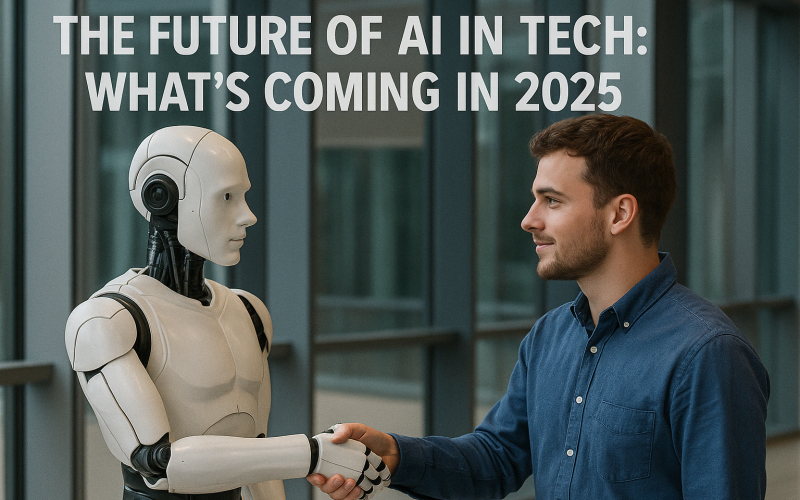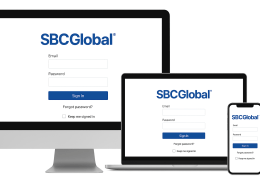Introduction
Artificial intelligence (AI) has already begun transforming the world of technology, and by 2025, its impact will be even more profound. From self-driving cars to personalized shopping experiences, AI is slowly but surely becoming embedded in every industry, making everyday tasks more efficient, intuitive, and seamless.
But what does the future hold for AI in tech? As the years progress, we can expect even greater advancements in AI, as well as new challenges and opportunities. In this article, we’ll dive into the key trends and developments in AI that are likely to shape the tech landscape in 2025. Whether you’re a tech enthusiast, a business owner, or simply curious about the future of AI, this guide will help you understand how AI in tech will evolve in the next few years.
What is AI and Why Does It Matter?
Before we look at the future, it’s important to understand what AI is and why it is such a game-changer. AI refers to the simulation of human intelligence processes by machines, especially computer systems. These processes include learning, reasoning, problem-solving, perception, and language understanding.
AI technology can be applied in various ways, from simple automation to complex decision-making systems. As AI continues to evolve, it has the potential to revolutionize industries, improve business operations, and enhance personal experiences in ways we couldn’t have imagined just a few years ago.
Why It Matters:
AI helps us solve problems faster. It can spot trends in data, recommend what to watch, or even drive cars. As we generate more data, AI becomes more powerful. In 2025, AI will help businesses save money, boost safety, and create new services.
By 2025, we can expect AI to play an even larger role in various aspects of life and work. Let’s take a closer look at how AI will change the tech industry in the near future.
Key Trends in AI for 2025
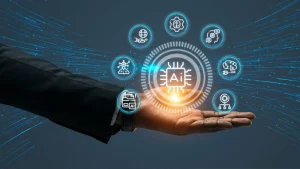
As we approach 2025, the field of AI is expected to expand and evolve in several exciting ways. Here are some of the most important trends to watch out for:
1. AI-Powered Automation Will Drive Efficiency
One of the biggest transformations that AI in tech will bring about is the rise of automation across industries. In 2025, AI-powered automation will significantly reduce the need for manual labor in various sectors, particularly in tasks like data entry, customer service, and administrative work. AI can learn patterns and make decisions based on large datasets, allowing machines to handle repetitive tasks with greater speed and accuracy than humans.
Businesses across sectors like manufacturing, healthcare, and finance will use AI to automate routine tasks, leading to higher productivity and cost savings. For example, in the healthcare industry, AI-powered automation could streamline patient management, making it easier for medical professionals to provide timely care.
Key Benefits of AI-Powered Automation:
- Increased productivity and efficiency.
- Reduced operational costs.
- Enhanced accuracy and fewer errors.
2. AI in Personalization and Customer Experience
By 2025, AI in tech will revolutionize how businesses interact with customers. AI algorithms will enable companies to personalize their services and products to an unprecedented degree. Whether it’s through tailored product recommendations, personalized marketing messages, or customer support powered by chatbots, AI will offer a level of personalization that feels intuitive and natural.
For instance, AI-driven recommendation systems will become even more sophisticated, predicting customer preferences with greater accuracy. Imagine a shopping website that not only suggests products based on previous purchases but also adjusts its offerings based on current trends, weather patterns, and even your mood.
Why AI in Personalization is Crucial:
- Better customer retention and satisfaction.
- Enhanced user experience.
- Increased sales through tailored recommendations.
3. The Growth of AI in Healthcare
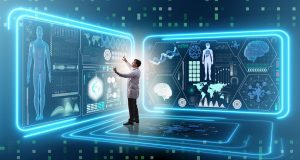
Healthcare is one of the industries where AI will make a tremendous impact by 2025. AI will be used not only in automating administrative tasks but also in improving diagnostics, treatment plans, and patient outcomes. Machine learning models will analyze medical data, helping doctors diagnose conditions more accurately and efficiently than ever before.
For example, AI-driven diagnostic tools could identify early signs of diseases such as cancer, allowing for earlier intervention and better treatment outcomes. Additionally, robotic surgeries powered by AI will continue to advance, making surgeries more precise and reducing recovery times.
Key Benefits of AI in Healthcare:
- Faster and more accurate diagnostics.
- Personalized treatment plans.
- Reduced healthcare costs through automation.
4. AI-Enhanced Cybersecurity
As cyber threats become more sophisticated, AI in tech will play a crucial role in improving cybersecurity by 2025. AI can detect unusual patterns, identify vulnerabilities, and respond to threats faster than human teams. In addition, AI can predict potential cyberattacks by analyzing massive amounts of data and spotting early signs of malicious activity.
With the increasing number of connected devices and digital transactions, AI-powered cybersecurity systems will become essential for protecting sensitive information and preventing breaches. In 2025, AI algorithms will be able to automatically detect and neutralize threats in real time, making the internet a safer place for individuals and businesses alike.
Why AI is Key to Cybersecurity:
- Real-time threat detection and prevention.
- Improved response to security breaches.
- Better protection of sensitive data and privacy.
5. AI-Driven Autonomous Vehicles
By 2025, autonomous vehicles powered by AI technology will become more mainstream. While we’re already seeing self-driving cars in testing phases today, the technology is expected to advance significantly over the next few years. In 2025, we’ll likely see more autonomous vehicles on the road, including not just cars but trucks and public transportation systems.
AI will enable these vehicles to navigate safely, avoid obstacles, and make decisions in real-time. The widespread adoption of autonomous vehicles will not only make transportation safer but also more efficient, reducing traffic congestion and carbon emissions.
Key Benefits of Autonomous Vehicles:
- Improved road safety with fewer accidents.
- More efficient and environmentally friendly transportation.
- Less reliance on human drivers.
6. AI for Predictive Analytics
AI can look at lots of data (like how people spend money, what they like to buy, or what happens in the weather) and then predict what will happen next. For example, AI can predict when a storm is coming, or when a product will be in high demand at a store. It’s like having a crystal ball but using smart math and information instead!
How this helps: It helps businesses plan better, keeps people safer, and makes life more convenient by predicting what might happen in the future.
7. Natural Language Processing (NLP) for Communication
AI is getting really good at understanding what people say, even if it’s complicated. Have you ever talked to a virtual assistant like Siri or Alexa? They use NLP, which is a type of AI that helps them understand and respond to your questions. In the future, AI will be able to hold more natural conversations and even understand jokes or emotions!
How this helps: It will make it easier for people to talk to their devices and get answers quickly, just like talking to a friend.
Challenges and Considerations in AI’s Future

While AI in tech promises to bring numerous benefits, there are challenges and concerns that need to be addressed as the technology continues to evolve.
1. Ethical Concerns and Bias
One major challenge with AI is the potential for bias in machine learning models. AI algorithms are only as good as the data they are trained on, and if the data is biased, the AI will reflect that bias. This could lead to discriminatory practices in hiring, lending, healthcare, and other fields. As AI becomes more integrated into decision-making, it’s essential to ensure that the data used is fair and unbiased.
2. Job Displacement
As AI takes over more tasks, there is concern that certain jobs will become obsolete, particularly in areas like manufacturing and customer service. While AI can enhance productivity, it’s important to ensure that workers are retrained and given new opportunities in industries that require human oversight and creativity.
3. Privacy Concerns
With AI’s ability to collect, analyze, and store vast amounts of personal data, there are serious privacy concerns. How data is collected, who owns it, and how it is used are all questions that need to be addressed as AI becomes more embedded in our daily lives.
Skills You Need in the AI Era
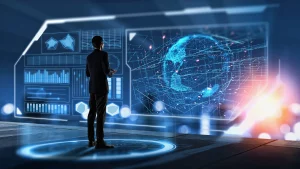
Even the best tech needs human talent. Key 2025 skills include:
- Data Literacy – Reading and questioning data outputs.
- Prompt Engineering – Crafting clear requests for generative AI tools.
- Cross‑Domain Creativity – Pairing AI insights with human empathy and design thinking.
- Change Management – Guiding teams through tech shifts.
Lifelong learning is the new job security.
Quick Tips to Prepare Your Business
- Start Small: Pilot one AI tool in a low‑risk area and measure gains.
- Clean Your Data: Good models need tidy, unbiased information.
- Upskill Staff: Offer training on analytics and AI ethics.
- Partner Wisely: Work with vendors who provide transparent models and solid support.
These steps build a foundation for larger AI rollouts as tech matures.
New AI Frontiers in 2025
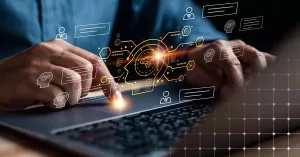
AI in Transportation
Self-driving cars will become safer with smarter vision systems. AI will manage traffic lights in cities to reduce jams. Riders will hail robo-taxis as easily as an app.
Tip: Keep your car’s software updated to enjoy new hands-free features as they roll out.
AI in Retail
Shops will use AI to track shelves and stock only what sells. Online stores will show you products you actually want based on your past likes.
Tip: Join loyalty programs powered by AI for personalized deals and faster checkout.
AI in Cybersecurity
AI will watch networks for odd behavior and block threats in real time. Phishing scams will lose power as spam filters learn new tricks fast.
Tip: Use antivirus tools that include AI scanning to protect both your phone and computer.
AI and Ethics
As AI grows, we need rules to keep it fair. In 2025, expect new laws on data privacy and clear labels on content made by AI. Companies will avoid bias by testing their AI on diverse data.
Tip: Check privacy settings on apps. Share only what you need to, and review permissions regularly.
Conclusion
By 2025, AI in tech will revolutionize how we live and work. From healthcare to cybersecurity, AI will drive efficiency, improve decision-making, and offer innovative solutions to age-old problems. As AI technology evolves, industries will become more productive, and businesses will provide better customer experiences than ever before.
However, as we embrace the future of AI, we must also address the ethical, social, and privacy challenges that come with it. By doing so, we can ensure that AI serves as a force for good, benefiting both businesses and individuals.






